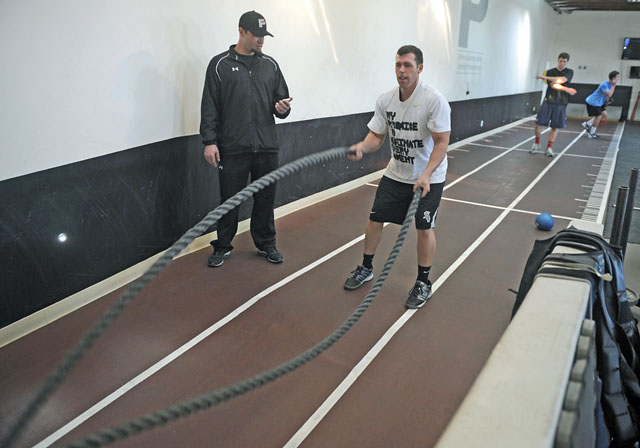Athletic Enhancement
Baseball Pros from Santa Barbara Say No to Steroids

While Barry Bonds was crushing baseballs to the tune of 762 home runs and Lance Armstrong was winning the Tour de France seven consecutive times, the specter of performance-enhancing drugs hung like a thick, impenetrable, dark cloud over the world of sport. Now, some light is starting to shine through. It’s too late for Armstrong (despite his anticipated made-for-TV confession to Oprah) to salvage his reputation among all but the most spellbound fans he deceived for years; and Bonds (despite pleading ignorance) may never be voted into the Hall of Fame — but their disgrace bodes for a cleaner future. The chances of competing on a level playing field are greatly enhanced for young baseball players like Dylan Axelrod and Cord Phelps.
Axelrod, 27, is a pitcher for the Chicago White Sox; Phelps, 25, an infielder for the Cleveland Indians. Both former Santa Barbara High athletes have bounced in and out of major league rosters during the past several seasons. Some time ago, they might have felt pressure to boost their prospects by taking banned but rarely detected substances. Given their makeup, they likely would have refused. Given recent news, the temptation is significantly diminished.
Major League Baseball (MLB) announced last week that it will institute random in-season testing for human growth hormone (HGH), making its drug policy the most stringent in America’s major sports. The announcement came days after Hall of Fame voters resoundingly rejected Bonds and pitcher Roger Clemens, the poster boys of the “Steroid Era.”
Axelrod and Phelps, who both work out at the Peak Performance Project (P3), a Santa Barbara gym that trains athletes with high-end principles, pondered those developments. “It’s definitely a big step to cleaning up baseball,” Axelrod said of the HGH testing. “The blood test is a little bit invasive, but at the same time it’s for the betterment of the game. It was like a snowball, what happened before: One person does it, and you feel you have to do it to compete. Now it feels like you can just play baseball.”
Axelrod went 2-2 as an infrequent starter last season. He hopes to find a spot in Chicago’s bullpen. “One of the White Sox’s strengths is pitching depth,” he said. “I have to stay patient, keep doing what I’m doing.” Recently married, he realizes there’s more to his life than throwing changeups. “Your character is what you’re left with when you’re done playing,” Axelrod said. “Baseball’s a short time in your life. Guys who have a great career finish at 40, and there’s a long time left in your life after that. You want to be held in high regard.”
Phelps said, “I don’t waste much time thinking about [drugs]. Hopefully, as testing gets better, people who are cheating get exposed a little more. If you’re caught, you should not be recognized for your achievements. The honor of the sport is more important.” But he does not want to see condemnation come too easily. “It’s tough to write off anybody that has a better than normal year,” he said. “There are lots of things that give you an advantage, maybe because you’ve seen pitchers before, you’ve put in more time in off-season and have a good year.”
Marcus Elliott, the sports science guru who runs P3, warns that public opinion is shifty on the issue. “These guys have an advantage now, figuring out how their bodies work and how to train smarter,” he said. “But I worry that people will get tired of the ongoing debate, tired of hearing about players cheating, and basically they say, ‘Aw, who cares? They all cheat.’”
Ryan Spilborghs, a Santa Barbara outfielder who made it to the Big Show for six seasons — including a World Series appearance with the Colorado Rockies — offered a realistic perspective. “You can’t look at that 10-, 15-year [steroid] era and say those players didn’t exist,” he said. “It was part of the game, just like it was part of the game that there were no African Americans [until 1947]. To ignore something because it wasn’t great is not smart.” He said the Hall of Fame should include certain players, maybe with an asterisk. “Moving forward, though,” he said, “any body who gets caught should be banned.”
Spilborghs, 33, will continue his career this season with the Seibu Lions of the Japanese League. “I wanted a chance to play as much as I could,” he said. “Financially, I could do better for my family than if I had stayed in the United States as a role player or a fourth outfielder on a minor league contract.”
HOT STOVE: Baseball stories will abound Friday night, January 18, at the annual Hot Stove Dinner, a joint benefit for the Santa Barbara Foresters and UCSB Gauchos at the Earl Warren Showgrounds. The guest speaker will be Milwaukee Brewers manager Ron Roenicke. Information: sbforesters.org.



